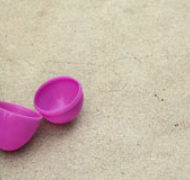The Empty Egg
Blog / Produced by The High Calling
Several years ago, we bought a pack of twelve plastic "Resurrection Eggs” filled with various symbols representing key moments in the Easter story. We worried the eggs could be a little cheesy, but our kids delighted in taking turns plucking one from the carton and shaking it like a birthday present to guess what was inside.
Each item makes a different sound as it rolls or thumps against the plastic: for example the whip—nothing more than a strip of leather—can be hard to guess as it softly brushes against the insides like a whisper, whereas we can easily identify the metallic chinka-chink of the noisy coins.
The eleventh egg, which contains a heavy rock to represent the stone rolled in front of the tomb, produces a satisfying thumpity-thump when shaken. And (spoiler alert!) the last egg is empty.
When our son was four years old, we manipulated the countdown so that we would open two eggs on Easter: the one with the rock and the empty “Easter” egg. Thinking we would give our son, the youngest child, a special treat, we arranged for him to take charge of the last one.
Easter morning, he watched his sister shake the one with the rock: thumpity-thump.
He shook his: Silence.
“I want that one!” he announced, pointing to the rock-filled egg.
“But you’ve got the Easter egg,” I said. “It’s the last one we open! It’s special!”
“I don’t want to open it.” He set it on the table and refused to pick it up.
After failing to convince our son to accept the great honor, my husband and I whisper-promised our daughter an extra chocolate bunny, and she agreed to swap. Our son, relieved, picked up the next-to-last egg, felt its weight in his hand, shook it a couple of times, and finally popped it open. The rock tumbled out. He stared at it. “A rock!”
“Yes, like the stone that was rolled in front of the tomb,” my husband said. We read about it in a passage from Matthew, and then it was time for the last egg.
“Ready?” my daughter asked. We all nodded. Everyone knew what was coming—everyone, that is, except our son. Being only four, he didn’t seem to remember details from the year before.
She popped open the final egg and held it out so that we could see inside, pausing for her brother to examine it closely.
"Aw, it's empty!" he complained, wrinkling his nose and shaking his head in disappointment as if he’d just witnessed a dud firecracker fizzle out on the Fourth of July.
"That's right," I said, stretching out the words. "It's empty. Just like the tomb!"
He looked up. "What?"
The others joined in, adding things like, "The egg is empty because the tomb was empty on Easter morning," "The tomb was empty because Jesus wasn't there," and "Jesus wasn't there because He's risen! He's not dead, He's alive!"
My son’s eyes grew wide as saucers and he gasped. Suddenly he squealed, leaped off his chair and started to run around the room, every part of him connecting and celebrating the message of the empty egg, the empty tomb.
“He’s got it!” one of his sisters exclaimed, and we all laughed at the understatement as he ran and ran and ran, shouting, "He's alive, He's alive, He's aliiiiiiive!"
Image by Jeff Carlson. Used with permission via Flickr. Post by Ann Kroeker, author of Not So Fast: Slow-Down Solutions for Frenzied Families.





